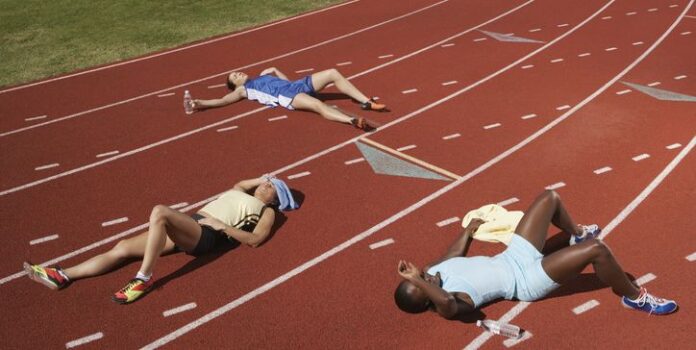The ability to run a marathon or even just get through an intense workout can be influenced by genetics. While most people have the same number of muscles, tendons, and bones, certain genetic factors may make some people athletic and others not so much.
One needs to know that genetics play a significant role in determining your physical abilities, including how good you are at sports, whether you’re tall or short, and even your body type. Therefore, it is true what you have heard about how do genetics power athletic performance.
Continue reading the article to learn more about genes and how they shape a person’s athletic ability.
Genes influence Athletic Performance and Endurance.
Although it’s true that “practice makes a man perfect,” there are people who are born talented. These individuals possess unique physical attributes, such as speed and endurance, which can be attributed to their genetic makeup.
Genes influence athletic performance through the regulation of muscle fibers. Muscle fibers have a variety of sizes, with each type having different speed and endurance capabilities.
For example, slow twitch fibers fire more slowly than fast twitch muscles but require less oxygen for activity. Therefore, they can sustain a movement for longer periods before fatigue sets in.
People Inherit Body Types from Genes.
Your genes are responsible for your body type. If you’re a marathon runner, you likely inherited the right genetic makeup for endurance.
But if your muscles aren’t well-suited to running long distances and require more rest days than others, it may be because of your genes.
The three main body types are mesomorphs, ectomorphs, and endomorphs—and each has different characteristics that affect their athletic performance. Of these, Mesomorphs are naturally muscular and often have athletic builds. They tend to be strong, fast, and agile and have a high metabolism.
Genes don’t determine everything. They just influence.
It’s important to remember that genes don’t determine everything, but they can influence how athletic you are.
While you may have been born with a natural predisposition toward endurance or sprinting, it doesn’t mean your performance is set in stone. You can further train your body to be more efficient at each type of movement and use the right nutrition strategies to maximize your potential.
Can Genetic Tests predict Athletic Performance?
Genetic tests can predict athletic performance, strength, and endurance. They can also do so for speed, agility, and flexibility.
Genetic testing has been used in sports for years to help athletes understand their strengths and how they can improve them through diet, training, or lifestyle changes. This test aims to find out which genes you have that may affect your ability to train optimally or that might make it easier for you to build muscle mass or recover from injury.
Conclusion
If you were wondering how do genetics power athletic performance, the bottom line is that genes influence athletic performance and endurance.
But they’re not always the only thing that matters. Athletes with the same genetic makeup can have different levels of success based on how hard they work and what resources are available to them.
The good news is that you don’t need to be an athlete to benefit from exercise. Even if your genes aren’t perfect for running or swimming, working out regularly can help improve your overall health and fitness.
Read Also
- Why comprehensive health insurance with maternity is beneficial in the UAEWelcoming a child is a significant milestone in any family’s journey. As exciting as this chapter is, it also brings with it a fair share of responsibilities—especially when it comes to planning for healthcare costs. Health insurance is now mandatory in the UAE, but as with any type of insurance, the smallest requirement might not… Read more: Why comprehensive health insurance with maternity is beneficial in the UAE
- Modern Approaches to Adolescent Mental Health Treatment for Lasting RecoveryWith increasing numbers of teens experiencing emotional and behavioral health concerns, adolescent mental health treatment has become more essential than ever. Conditions such as anxiety, depression, trauma and mood instability are on the rise, and effective support must evolve with these growing needs. Today’s treatment models blend evidence-based therapy with flexible access and holistic care, giving… Read more: Modern Approaches to Adolescent Mental Health Treatment for Lasting Recovery
- How to Find a 5-Star Dentist Near YouChoosing a dentist is more than just finding someone who can clean your teeth. It’s about selecting a trusted partner in your long-term oral health. A 5-star dentist not only provides excellent clinical care but also delivers a positive patient experience, from the moment you walk in until the moment you leave. Whether you’re new… Read more: How to Find a 5-Star Dentist Near You
- Your Easy-Peasy Guide to Brewing Amazing MatchaHey there! So, you’ve heard all the buzz about matcha – that vibrant green powder that’s not just pretty but packed with good stuff? It can seem a little fancy and intimidating at first, but trust me, making a delicious cup at home is simpler than you think. Forget complicated ceremonies for now; let’s just… Read more: Your Easy-Peasy Guide to Brewing Amazing Matcha
- Embracing Holistic Wellness: Insights from a Lansing, MI Health CenterReframing Health: Moving Beyond Symptom Management Treating only symptoms often offers quick relief, yet long-term results stay out of reach. When care zeroes in on isolated complaints, the bigger picture, such as stress, behavior, or lifestyle, often gets missed. Research shows that whole-person care, which looks at physical, emotional, and environmental factors, yields better outcomes… Read more: Embracing Holistic Wellness: Insights from a Lansing, MI Health Center
- VO₂ Max Testing Explained: What It Is & Why It Matters for Your HealthVO₂ max sounds like a term reserved for elite athletes, but it’s among the most accurate measures of your lifetime and general condition. Moreover, it goes beyond performance. Monitoring your VO₂ max will help you to ascertain your body’s capacity to control stress, its oxygen consumption efficiency, and your internal ageing process. If you have… Read more: VO₂ Max Testing Explained: What It Is & Why It Matters for Your Health







